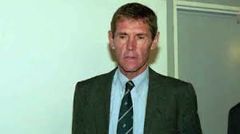Difference between revisions of "Anthony White"
(Inaugurating) |
m |
||
| Line 5: | Line 5: | ||
'''Anthony White''', a former soldier in the white army of Rhodesia, now [[Zimbabwe]], was accused ten years after the killing of [[Swedish]] Prime Minister, [[Olof Palme]], who was murdered on 28 February 1986. He denied any involvement in the [[Olof Palme/Assassination]]. | '''Anthony White''', a former soldier in the white army of Rhodesia, now [[Zimbabwe]], was accused ten years after the killing of [[Swedish]] Prime Minister, [[Olof Palme]], who was murdered on 28 February 1986. He denied any involvement in the [[Olof Palme/Assassination]]. | ||
| − | On 1 October 1996, Anthony White said in a telephone interview from the sawmill he runs in the Mozambican port of Beira that he was "absolutely shocked" by the allegation, made by a former [[South African]] agent, Mr [[ | + | On 1 October 1996, Anthony White said in a telephone interview from the sawmill he runs in the Mozambican port of Beira that he was "absolutely shocked" by the allegation, made by a former [[South African]] agent, Mr [[Dirk Coetzee]].<ref>''[https://www.irishtimes.com/news/man-denies-role-in-palme-killing-1.91274 "Man denies role in Palme killing"]''</ref> |
==Complaint to the ECHR== | ==Complaint to the ECHR== | ||
Revision as of 16:03, 28 February 2020
 | |
Anthony White, a former soldier in the white army of Rhodesia, now Zimbabwe, was accused ten years after the killing of Swedish Prime Minister, Olof Palme, who was murdered on 28 February 1986. He denied any involvement in the Olof Palme/Assassination.
On 1 October 1996, Anthony White said in a telephone interview from the sawmill he runs in the Mozambican port of Beira that he was "absolutely shocked" by the allegation, made by a former South African agent, Mr Dirk Coetzee.[1]
Complaint to the ECHR
In September 2006, the European Court of Human Rights ruled that newspapers did not violate a man's privacy by reporting that he was suspected of murdering Swedish Prime Minister Olof Palme.
Two Swedish newspapers, Expressen and Aftonbladet, reported in 1996 that investigators were looking into allegations that Anthony White, a former soldier in the Rhodesian army, had shot Palme dead as he left a Stockholm cinema in 1986.
But no evidence was found to support the allegation – made by Dirk Coetzee, a former South African terrorism expert – and the Swedish authorities subsequently ended their enquiries into White.
White complained, first to Swedish tribunals and then to the Strasbourg-based European Court of Human Rights, saying the reports had damaged his good name and constituted an attack on his private life.
ECHR ruling
But the ECHR ruled that the newspapers had been within their rights to publish information about the episode:
- "The Court noted that, in the series of articles, the newspapers endeavoured to present an account of the various allegations which was as balanced as possible and that the journalists acted in good faith. The Court also considered that the domestic courts made a thorough examination of the case and balanced the opposing interests involved," the court said in a statement.
- "The Court found that the courts were justified in finding that the public interest in publishing the information in question outweighed the applicant's right to the protection of his reputation," the statement added.
Palme's murder has never been solved.[2]
Defence of incrimination
| Peter Caselton: accusing Bertil Wedin, excusing Anthony White |
In a YouTube video uploaded in July 2015 a former South African special agent, Peter Caselton, denied the claim that Olof Palme was killed by Anthony White, instead accusing Bertil Wedin of the murder:
- "That would be guess work, it's up to the Swedish police to interview Bertil Wedin and they can form an opinion. I have just spoken to him in connection with the fact that Anthony White is not a person that was involved in the Palme murder and this was relayed to me last Sunday by Eugene de Kock in the prison and I feel that is unnecessary for people to embark on wild goose chases when it's going out on a tangent. I feel that the senior members of the SADF have to crawl out from under the stands that they're hiding under and start taking the blame like any other military organisation and any other senior officers with any self esteem or pride would have done a long time ago."[3]